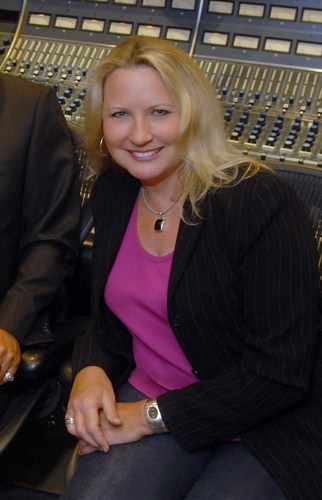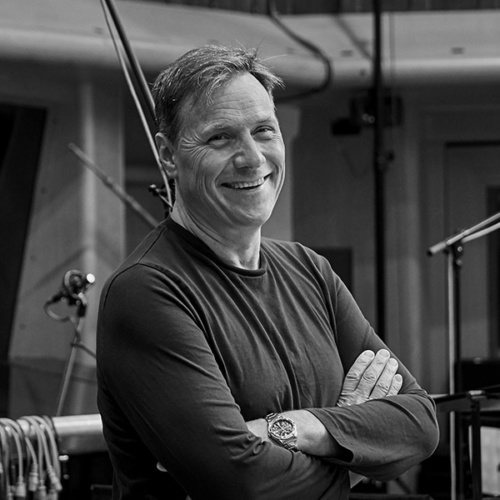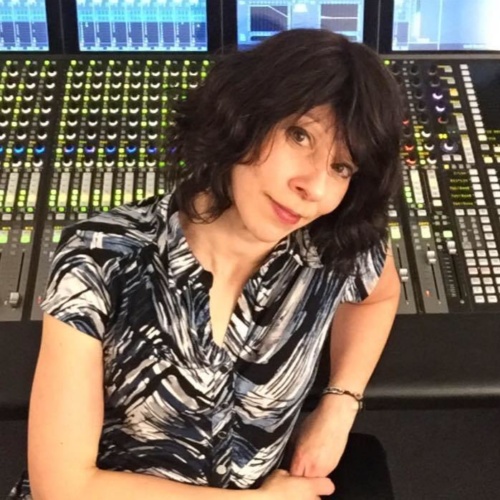Music Career Finder
Survey Start
Recording Engineer

How To Become a Recording Engineer
- Career Description
- Salary
- Career Outlook
- Career Path
- Experience & Skills
- Education & Training
- Additional Resources
- Sources
- References
Career Description
A Recording Engineer (AKA Sound Engineer or Audio Engineer) is responsible for recording every part of the songs you hear. Every guitar strum, drum hit, vocal run, and everything else is thanks to the Recording Engineer.
They set up the microphones to capture the best possible sound. They’re at the sound board ensuring all the input and output levels are right. They’re in charge of capturing the highest quality sound possible, making the job of the mixing engineer and mastering engineer as easy as possible. In fact, sometimes the Recording Engineer ends up being the mixing and/or mastering engineer as well.
Ultimately, they’re the one in charge of shaping the sound of the tracks. So they need to know the ins and outs of the most commonly used Digital Audio Workstations, which are currently Pro Tools, Logic Pro, and Ableton. If you want to work as a Recording Engineer in a professional studio, you definitely need to know Pro Tools and probably Logic Pro. This is because nearly every professional studio in the United States runs on Pro Tools.
Recording Engineers also work as live sound engineers, like concerts, corporate events, festivals, and other gatherings that require sound. The Engineer is in charge of setting up and running the sound systems, conducting a soundcheck, and mixing the live sound so the audience can hear everything clearly and accurately.
Recording engineer Mary Mazurek said someone in her career can do many different things.
“An Audio Engineer can record for album release, can record audio for streaming, can work with audio for broadcast, can do podcasts, work on TV, work on movies,” she said. “There are a variety of ways in which Audio Engineers work.”
Audio engineer vs. music producer: Music producers guide the creative process while audio engineers execute the technical details, and their collaboration is essential for bringing a music project to life.
In this article, you’ll be hearing from Recording/Audio Engineers working in rock, classical, and film scoring:
- Lenise Bent (Blondie, Fleetwood Mac, Steely Dan)
- Geoff Foster (The Lion King, The Dark Knight Rises, The Pirates of the Caribbean)
- Mary Mazurek (John Bruce Yeh, Lara Downes, Fareed Haque)
Salary
Engineers on staff at a recording studio who are either hourly or salaried employees receive regular paychecks from the studio. Others might work with clients on a project or freelance basis, especially if they are also mixing and/or producing the recorded music. They could be paid by the hour, by the day, or earn flat fees on a project basis.
They may work at a professional recording studio, in their home studio, a mastering studio, on the road with live acts, or all the above. Hourly rates typically start at around $40 and can be as high as $100 or even more for top pros. Some Mastering Engineers charge by the song, and the fee can range from a few hundred to many thousands of dollars.
Recording engineer Geoff Foster (The Lion King, The Dark Knight Rises, The Pirates of the Caribbean) said you could earn anywhere from $125 a day to $4,000 a day.
When starting out, perhaps working as an Intern or Runner, pay could be low or nonexistent. With more experience, working as an Assistant Engineer or a Producer, the pay should increase to support typical living costs, depending on where one lives. Pay by the day usually ranges between $200 to $500 and can be higher for well-known Engineers. Project-based pay can also vary a lot depending on the scope of the project and the prestige of the artist, Producer, and Engineer.
Some Recording Engineers are also Session Musicians and may have other work outside of the studio to help support them, such as teaching or working in a non-music-related job. Others might work in a sub-discipline, such as acoustical design, software development, research, sound design, architectural acoustics, or electrical engineering.
According to Glassdoor, the average annual salary for a Recording Engineer is approximately $73,600. The salary range runs from $46,000 to $84,000. Although it’s a highly competitive field, there is a consistent demand and the outlook for future growth seems strong.
Hey, what do you think about trying our new Music Career HelperMusic Career Helper really quick? It’s totally free and could help get your career moving fast! Give it a try. It’s totally free and you have nothing to lose.
Career Outlook
Recording Engineers are an important part of the music industry, as anyone seeking to make recordings needs to hire one. There’s a huge demand for new music from fans and for use in multimedia such as films, advertising, TV, radio, broadcast sporting events, and video games.
While streaming has made it harder for Recording Artists to profit from their music, there are still plenty of successful artists who need Engineers to help them capture their music in recordings. Recording Engineers can also vie for other roles, such as mixing live sound for concert tours, doing sound and recordings in theaters, or managing audio engineering teams at sports stadiums.
Getting started, it will take some time to learn all the skills needed to become an Engineer. Many students choose to earn a music degree or take courses at a college or university where they have access to current gear and can expand their professional network with other students and faculty. After school, working as an Intern at a studio where you could observe and be a part of making recordings under experienced professionals is the usual path for the budding Engineer.
Being a Recording Engineer is extremely competitive since many people want this kind of work. There tend to be fewer opportunities than applicants, so it does require hard work, talent, perseverance, and patience to break into a scene.
You should also know that Recording Engineers tend to work long days. When a record label or artist book a studio for the day, that “day” may be 10-14 hours for the engineer. Not only does the engineer need to be there for as long as the artist needs to record or has booked the studio, but the engineer also needs to set up equipment before the session and tear down afterward. Because of this, maintaining a healthy work-life balance can be difficult.
Recording engineer Lenise Bent (Blondie, Fleetwood Mac, Steely Dan) said you shouldn’t plan on having much of a family life, at least not at first.
“If you want to be an Engineer, the idea of getting married and having a family is off the table—at least when you’re starting out,” she said. “I’ll be in the studio tonight from eight to God-knows-when. Music industry people work 24/7.”
There is good news, however. The US Bureau of Labor Statistics (BLS) projects 8% annual growth in the sound recording industry between 2018-2028. While this may not seem like a lot, the BLS states that this 8% growth rate is faster than the average rate of growth for many careers.)
Career Path
Aspiring Recording Engineers often start as Runners before moving on to become Assistant Engineers and finally becoming Engineers. Advancement can come in the form of working with celebrity clients, working at a famous recording studio, or running their own personal recording studio. At outset, learning and gaining experience should take center stage.
With some training and years of experience, Recording Engineers build their resumes in various ways. There are a number of sub-fields Recording Engineers can find work in. Examples include electroacoustics, musical acoustics, psychoacoustics, architectural acoustics, audio signal processing, and electrical engineering. Some teach. They may work recording speech or capturing sound on remote location for broadcast TV and films.
Additional roles and titles for Recording Engineers include Mastering Engineer, Mixing Engineer, Live Sound Engineer, Front-of-House (FOH) Engineer, post-production for film, Assistant Engineer, Monitor Engineer, Audio Engineer, Tonmeister, and so on. Some of the terms are vague and can overlap, depending on the production. Other times these terms could be very specific.
To get that first engineering gig, it’s all about attention to detail. Attend a good music production/engineering degree program, pay attention in class, and bring that attention to not only your studio time, but your job application process. Once you land the first position, it’s crucial to make a good impression on everyone involved, since you will likely need them for referrals for future work. It takes a long time and very hard work to build a stellar reputation.
Recording Engineer Mary Mazurek (John Bruce Yeh, Lara Downes, Fareed Haque) said getting an internship is one of the best moves you can make as a beginner.
“Ask to intern,” she said. “I believe that internships can be very powerful and positive learning experiences.”
“I also encourage my students to pick an audio role model,” she said. “I say, ‘Okay, think about some music you like and find out who engineered it or produced it.’ Send them a message on social media or something and ask them a poignant question.”
The most successful Engineers either hold down a salaried position at a studio or record company, are kept on retainer by major artists, or can take their choice from a host of plum offers that come their way. They keep an extremely busy schedule, sometimes working twelve hours a day or more under deadlines.
An alternative option is to run your own recording studio, either in your home or in a secondary space that you would rent or own. This means you’ll need to buy the equipment necessary for the type of recording you plan to do. You will also most likely need to soundproof your space. And you’ll need to do your own outreach, meaning you’d have to find and persuade musicians to come to your studio space to record. In this context, you may also end up producing and mixing the music you record.
This is all very doable though. Many engineers, producers, mixing engineers, and mastering engineers have their own studios, and they make a living working with sound. Just be prepared because it is essentially like running a small business.
Engineers must also take time to manage their schedules and respond to work-related messages. There are preproduction meetings to attend, recording sessions, live gigs, travel, and many other tasks and responsibilities, such as overseeing the maintenance and updating of equipment. In short, in-demand Recording Engineers are super-busy professionals.
Basically, do good work, be humble, be easy to work with.
“…When you’re trying to get ahead in the music industry,” Foster said, “you don’t need to scream and shout about how amazing you are and what you’re doing. If you shine, if you do a great job, I promise you the people who need to see it will see it, will clock it, and will give you work.”
Experience & Skills
The main skills you’ll need to succeed as a Recording Engineer:
- Recording software (like Pro Tools and Logic Pro)
- Recording hardware (like knowing a soundboard and MIDI devices)
- Microphone placement
- Room acoustics
- At least a general knowledge of music
- Problem-solving (both interpersonal problems and technical problems)
- Collaboration
- Interpersonal skills (Foster said “the human side of the recording process is a significant part of engineering”)
- Patience
There’s no substitute for on-the-job training, which is why most Recording Engineers get their start working as Interns or Runners at a studio. Watching and understanding what the experienced Engineers do, and why they do it, is an important part of learning the skills needed to become a professional.
Most studios prefer to hire Interns from a college or university program, as they want assurance that an Intern comes with a base level of knowledge and skills, as taught in the programs. For example, an Intern would be expected to already know how to create and manage projects using Pro Tools. It has become more common for aspiring Engineers to attend a degree program to fully prepare for such a demanding and competitive career.
Starting out, a student or Intern needs to learn their way around the studio. They need to know how to wrap cables, set up and place microphones, set up the recording console, and put everything away properly at the end of the session.
Engineers must also have extensive knowledge of the principles and techniques of audio recording and signal processing. They need to know how the commonly used recording and music equipment works, how to get the best sound out of it, and be able to troubleshoot effectively when problems arise. They must know which equipment to use, and when to use it.
But Foster said there’s still a lot of art to being an audio engineer.
“…In my experience, the great Engineers, they listen…to both people & the machinery,” he said. “They react to the musicians and they understand that there is so much more than just the technology.”
Recording Engineers should also have a broad understanding of the different sounds used in all kinds of commercially produced music today and how they are produced and recorded. This is usually achieved through extensive listening to recorded music, analyzing sessions, doing live sound for concerts, and direct experience working in the studio and on sound stages.
The Audio Engineer needs to be a team player and a strong communicator, be able to listen carefully, and be flexible in achieving the artistic vision of sometimes finicky artists and Producers. They need to have excellent people skills and be able to resolve conflict and reduce tension under sometimes difficult working conditions. The best Engineers are very creative people and get satisfaction from working with others to achieve difficult goals.
A big part of the engineer’s job is deciphering what is in the artist’s imagination and making it a reality, according to Bent.
“The Producer and the musicians will be speaking in emotional terms and you’ll have to be able to interpret technically what they’re expressing to get an emotional response,” she said. “I like to create with others. A good Engineer is somebody who’s easy to get along with–because you’re on a team. You have to be a people person. But you don’t want a real chatty Engineer. You gotta get work done.”
Education & Training
Recording Engineers typically go to college to earn at least a bachelor’s degree, and some continue their studies in graduate school to earn a master’s. Their formal training can be in music, audio engineering, electrical engineering, computer science, fine arts, film, multimedia, communications, sound design, or broadcasting. There are some excellent sound and audio recording and production programs offered by colleges and universities in the US and Canada.
To you need to get a degree to be an engineer? No, but it can help, said Mazurk.
“You could do it without going to school, without a degree—it’s possible,” she said. “But I think going to school opens up your perspective and also gives you networking opportunities, because your fellow students will also go out into the world and work, and they can be a resource.”
Bent said that if you do go to school to be an audio engineer, she recommends attending a trade school like the Musician’s Institute in Hollywood or the Berklee College of Music in Boston.
Some Recording Engineers are self-taught and become professionals through extensive working experience, although this is becoming increasingly rare. There’s a huge body of technical knowledge to assimilate; attending a formal training program allows students to get access to expensive equipment in up-to-date facilities while they learn important principles and techniques.
If studying music, Recording Engineers will need to play an instrument and complete core music studies, such as music theory, ear training, arranging, ensembles, and instrumental labs. Some programs accept students who do not play an instrument or allow the computer to count as a “digital musical instrument” or DMI.
Every college is different, and some require musicianship skills while others don’t. Instead, they might prefer their students study some area like electrical engineering, computer science, physics, math, or business to support their future career ambitions in audio arts, engineering, and music production. Students come to college programs from a wide variety of academic backgrounds.
At the best programs, the core concentrate for music production and recording engineering majors might include courses in critical listening, production analysis, mix techniques, audio and MIDI systems, audio technology, multitrack techniques, advanced production, acoustics, and music business. Students learn techniques for creating multitrack recordings of ensembles and how to make quality recordings from electronic sources.
They also learn how to overdub, edit, and mix using analog and digital audio, and apply their technical and business knowledge to the development and execution of complex creative projects. They learn critical thinking and also how to adapt to a rapidly changing technical and business environment. They also choose some electives, for example, a course on mastering techniques or room acoustics.
Students in top schools also learn how to market themselves, start a business, and find work in the field. Graduating from a good college or university program and securing an internship is the best way to jump-start your career as a Recording Engineer.
Additional Resources
Bent recommends joining the Audio Engineering Society–especially as a student–because of the networking and learning opportunities (not to mention the lower membership rates). “Go to meetings, go to sessions, ask if you can help,” she suggests.
Also: The Acoustical Society of America (ASA) is a membership organization that offers conferences, meetings, and a publication. ASA also creates national standards, for example for the measurement of sound pressure levels in air.
Sources

Lenise Bent
Born in Los Angeles, Lenise Bent started her career at the early age of 8 in the Screen Children’s Guild, doing extra work in the TV and film industry. She already had her first tape recorder by then, which she had begged for and received on her 8th birthday.
Coming from a musical family, singing and performing were a part of everyday life, with Lenise studying piano and flute and making her first recording with the Compton Youth Symphony Orchestra at 9 years old. Throughout high school she split her time between seeing films and live music every chance she got and eventually went on to study film & TV and radio production at USC & Cal State Long Beach.
As her passion for music began to dominate her life Lenise shifted her studies to audio engineering at SoundMasters Recording Institute, one of the only recording schools in existence at that time. Soon after graduation, she started her recording career as an Assistant Engineer at The Village Recorders in Los Angeles, working on several albums including Aja by Steely Dan, Breakfast in America by Supertramp and Tusk by Fleetwood Mac.
Later she became Chief Engineer for Producer Mike Chapman recording the platinum-selling record AutoAmerican for Blondie plus several of Chapman’s other artists such as The Knack and Suzi Quatro, recording at a variety of studios which include The Record Plant, Air London, and United Western, which later became Ocean Way, then Cello, and now EastWest Studios. She was the first woman to receive an RIAA Platinum album, for her work on AutoAmerican.
Lenise has taught sessions at Born in Los Angeles, the Audio Engineering Society’s Virtual Vienna Convention, NAMM and at the Los Angeles chapter of the Audio Engineering Society, of which she is also a member.
She is repped by Super Secret Agents. She has been profiled by and mentioned in Sound Girls, Women in Vinyl, RecordProduction.com, Sound and Video Contractor, Smoke Free Music Cities, The WIMN, Vulture, U Discover Music, TV Technology, Live Design Online, Studio Expresso, the Vintage King Audio blog, and the book Women in Audio.
You can also hear her on episodes of the Art of Rock with Kosh & Friends, Somewhere Studios, Music History Project, Working Class Audio, Strong Writer on the Radio, and Produce Like a Pro podcasts. For video, check her out on Making Music Herstory,
Her discography is available on Discogs and Genius.com.

Geoff Foster
Geoff has established himself as one of the leading Recording Engineers in the film scoring world. Starting with Stargate in 1994, he has worked on scores for numerous major movies and albums for bestselling artists. These include scores nominated for Oscars, BAFTAs, Golden Globes, and a Golden Reel.
He has won Grammys for Joni Mitchell’s concept album Both Sides Now and the scores for films Ray and Dark Knight. In 2012 he was named Recording Engineer of the Year at the Music Producers Guild Awards.
His major film score credits include Judy, Dunkirk, Mission: Impossible-Fallout, Interstellar, Gone Girl, The Great Gatsby, Moon, The Dark Knight Rises, Sweeney Todd, The Chronicles of Narnia, The Lion King, The Ring, The Others, Moulin Rouge, Casino Royale, The Last King of Scotland, Inception, Sherlock Holmes, The Pirates of the Caribbean films and The Da Vinci Code.

Mary Mazurek
Mary Mazurek is a GRAMMY-nominated Recording Engineer. Her nomination was awarded by the Recording Academy for the 61st Annual Grammy Awards in the category of Best Engineered Album, Classical. She is also a Broadcaster and Radio Producer. Her work is regularly featured on WFMT Radio and WFMT.com.
Additionally, she a sought-after Educator and Speaker who enjoys contributing in the classroom and on panels and committees within her industry and beyond. She serves as a role model and advocates for women in the recording industry, which presently is less than 5% female. She loves sharing her sonic insights across disciplines.
References
- 1. "Recording Engineer Salaries in United States". Glassdoor.com. published: Dec 22, 2019. retrieved on: June 18, 2020
- 2US Bureau of Labor Statistics. "Broadcast and Sound Engineering Technicians". Office of Occupational Statistics and Employment Projections. published: 10 April 2020. retrieved on: 25 June 2020